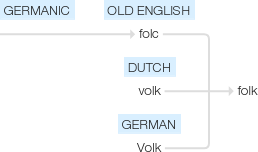Folk
Old English folc, of Germanic origin; related to Dutch volk and German Volk .
wiktionary
From Middle English folk, from Old English folc, from Proto-West Germanic *folk, from Proto-Germanic *fulką, from Proto-Indo-European*pl̥h₁-gós, from *pleh₁-(“to fill”). Cognate with German Volk, Dutch volk, Swedish folk and Danish folk. Doublet of volk.
etymonline
folk (n.)
Old English folc "common people, laity; men; people, nation, tribe; multitude; troop, army," from Proto-Germanic *fulka- (source also of Old Saxon folc, Old Frisian folk, Middle Dutch volc, Dutch volk, Old High German folc, German Volk "people"). Perhaps originally "host of warriors:" Compare Old Norse folk "people," also "army, detachment;" and Lithuanian pulkas "crowd," Old Church Slavonic pluku "division of an army" (hence Russian polk "regiment"), both believed to have been borrowed from Proto-Germanic. Old English folcstede could mean both "dwelling-place" and "battlefield." According to Watkins, from PIE *ple-go-, suffixed form of root *pele- (1) "to fill," which would make it cognate with Greek plethos "people, multitude," and Latin plebes, "the populace, the common people." Boutkan thinks both the Germanic and Balto-Slavic could be a common borrowing from a substrate language.
Superseded in most senses by people. Generally a collective noun in Middle English, however plural folks is attested from 15c. Old English folc was commonly used in forming compounds (59 are listed in the Clark Hall dictionary), such as folccwide "popular saying," folcgemot "town or district meeting;" folcwoh "deception of the public." Modern use of folk as an adjective is from c. 1850 (see folklore).
